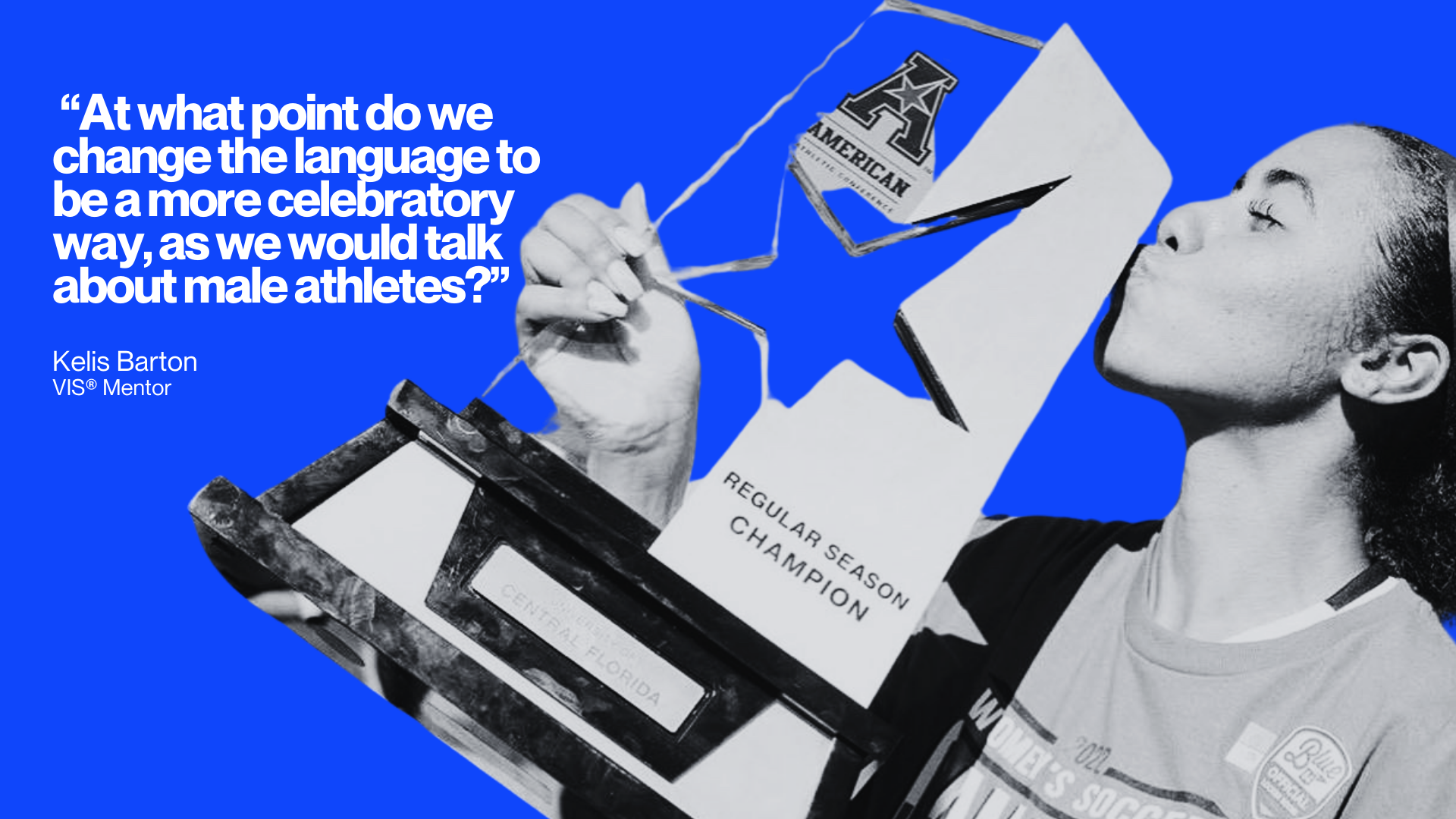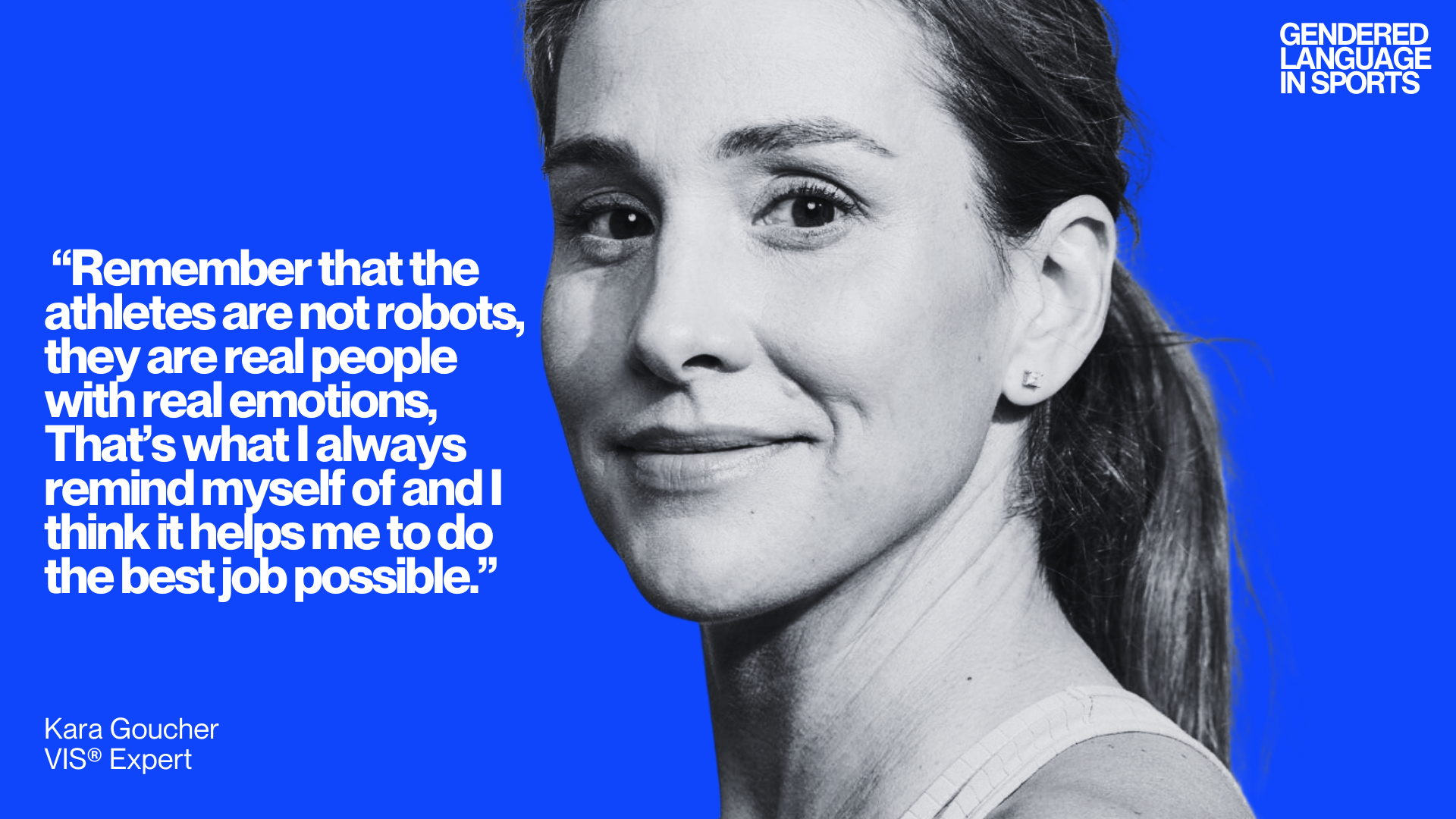When we’re used to women's sports coverage being provided by men, it can be difficult to imagine an alternative where the collective VOICE of women athletes is uplifted through the media. But the tide of athletic coverage is turning, and strong women are setting an example of what it looks like to speak up for women athletes and how to use their experiences in sports to tell real stories. In this article, VIS Mentor Kara Goucher and Kelis Barton, and VIS Expert Zora Stephenson talk about the intersection of elite athletic careers and working in sports media, sharing advice on how to get involved in storytelling, and absorbing the stories told about us.
From Runner to Race Analyst
Goucher is a decorated former professional runner, two-time U.S. Olympian, world medalist in the 10,000 meter, and, as of 2021, an NBC analyst for major races including the 2021 Summer Olympics. Goucher says she was reluctant to call races at first, but she used her experience as an elite athlete to bring both expert analysis and compassion to her announcing.
Turning Experience Into Expertise
As a professional athlete, Goucher experienced highs and lows in how she was covered. “I always left my best out there and it hurt when people framed my efforts as a failure,” she says. As an announcer, Goucher prioritizes recognizing the accomplishments of an athlete without “demeaning the athlete that got it wrong that day.” Her experience in the athletic spotlight has given her the clarity and empathy to keep in mind the emotions of the athletes she covers. “[I] remember that the athletes are not robots, they are real people with real emotions,” she says. “That’s what I always remind myself of and I think it helps me to do the best job possible.”
Navigating the Digital Wilderness
Whether it’s an article in a school paper or a national publication, receiving attention as a woman athlete means being on high alert for criticism or stereotypical language. It’s important to remember that every confident woman athlete in magazines or sportswear commercials had to go through those first nerve-wracking features as well. Their experiences and advice act as a roadmap for all women trying to reckon with how we are talked about in the media. “[B]e true to yourself. Remember that you are the author of your own story, not some reporter or journalist,” Goucher says. “Keep living authentically and eventually, the world will see you for who you are.”

Staying in the Game
Barton loves staying close to the game she once played through storytelling and content creation. Barton was a defensive player for the women’s soccer teams at both Washington State University and the University of Central Florida, where she pursued degrees in journalism and multimedia production. Though taking a step back from her professional soccer career due to injury, Barton’s content creation and media coverage for organizations like the National Women’s Soccer League allows her to be involved in a meaningful way.
Telling the Important Stories
As an elite athlete and a woman of color in sports, Barton has a unique perspective on the disparities in coverage in the sports media industry. Her work is to elevate all athletes and tell the stories of all the women who make a team great. “There’s a lot of girls on the field, but those girls on the bench are working just as hard,” she says. “I want to be able to highlight who these people are.”
Barton also expresses frustration with the content of the coverage of women’s sports. “Something that almost bothers me is that we keep using this language of being so shocked that women are putting up these numbers or breaking these records,” she says. “At what point do we change the language to be a more celebratory way, as we would talk about male athletes?”
A VOICE for Change
Barton demonstrates the unique intersection of an elite athletic career and creating professional content to cover sports. She expresses the importance of using the knowledge and expertise of collegiate athletics to make an impact in the media industry. “[Athletes] have a different work drive and priorities,” she says. “Media is an industry of confidence. Know what you bring to the table.” Barton’s drive and ambition have led her to unique opportunities and the ability to see sports and media through different lenses. If she could give any advice to women athletes entering the media industry, it would be to know that you belong there. “There’s a spot for everyone in the media,” she says. “Someone always needs your voice.”

Making Coverage History
Stephenson, a Elon women’s basketball alum, has used her experience playing sports and her degree in communications media arts and entertainment to become a successful play-by-play announcer and reporter for NBC Sports. Covering mainly Big Ten football and women’s basketball, Stephenson became the first woman in franchise history to serve as a play-by-play voice for the Milwaukee Bucks. Staying involved through reporting has shown her how much the game of women’s basketball has grown. “Last week I was covering Iowa State and I got emotional,” she says. “There was traffic going to a women’s college basketball game.”
The Power of Showing Up
Stephenson acknowledges the gendered inequity in media coverage, but she’s in a unique position to help make that change. “I want more than anyone for there to be equal coverage of men’s and women’s sports — the same critiques analysis and 24-hour news cycle that the men do,” she says. “The part I play in that is being the most prepared that I can, being excited during games. The bar is rising; it’s not just about exposure, it’s the right exposure.” By showing up and doing her best job, Stephenson is changing the conversation about women’s sports and women in the sports media industry for the better.
Advocating On and Off the Screen
The strength and VOICES of women in sports coverage are important, but Stephenson emphasizes that this alone isn’t enough. The sports media industry needs to put pressure on their male counterparts to be vocal about issues in the language and quantity of women’s sports coverage. “It's not just up to women to continue to make sure that we are heard and we are seen in the right way,” she says. “It’s up to everybody, especially men, to make sure that they are doing their part because no one can do it alone.”
These three women show us what it means to use their experiences in elite athletics and sports coverage to flip the script. They set an example for women who are working towards making change in the male-dominated sports industry and introduce empathetic language to the women athletes they cover. Goucher, Barton, and Stephenson demonstrate the strength of using our VOICE as those who understand what it’s like to be a woman athlete.



